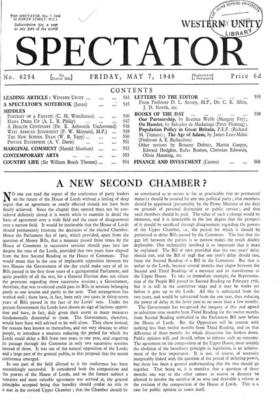A NEW SECOND CHAMBER ?
NO one can read the report of the conference of party leaders on the future of the House of Lords without a feeling of deep regret that an agreement so nearly effected should not have been finally achieved. Since the chapter thus opened must not be con- sidered definitely closed it is worth while to examine in detail the basis of agreement over a wide field and the cause of disagreement over a narrow field. It would be intolerable that the House of Lords should permanently frustrate the decisions of the elected Chamber. Hence the Parliament Act of 1911, which provided, apart from the question of Money Bills, that a measure passed three times by the House of Commons in successive sessions should pass into law despite the veto of the Lords, provided that two years have elapsed from the first Second Reading in the House of Commons. That would mean that in the case of implacable opposition between the two Houses the Government of the day could make sure of all its Bills passed in the first three years of a quinquennial Parliament, and quite possibly of all the rest, for a General Election does not vitiate the provision regarding three successive sessions ; a Government, therefore, that was re-elected could pass its Bills in sessions belonging partly to one session and partly to the next. That arrangement has worked well ; there have, in fact, been only two cases in thirty-seven years of Bills passed in the face of the Lords' veto. Under the present Government the Lords have shown no sign of factious opposi- tion and have, in fact, duly given their assent to many measures fundamentally distasteful to them. The Government, therefore, would have been well advised to let well alone. They chose instead, for reasons best known to themselves, and not very obscure to other people, to introduce a measure reducing the period for which the Lords could delay a Bill from two years to one year, and requiring its passage through the Commons in only two successive sessions instead of three. It was out of the natural opposition of the Lords, and a large part of the general public, to that proposal that the recent conference emerged.
In one part of the field allotted to it the conference has been astonishingly successful. It considered both the composition and the powers of the House of Lords, and on the former subject a tentative and most valuable agreement was arrived at, the general principles accepted being -that heredity should confer no title to a seat in the revised Upper Chamber ; that the Chamber should be
so constituted as to secure as far as practicable that no permanent' majority should be assured for any one political party ; that members should be appointed (presumably by the Prime Minister of the day) on grounds of personal distinction or public service ; and that such members should be paid. The value of such a change would be immense, and it is lamentable in the last degree that the prospect of it should be sacrificed through disagreement regarding the powers of the Upper Chamber, i.e., the period for which it should be permitted to delay Bills passed by the Commons. The fact that the gap left between the parties is so narrow makes the result doubly deplorable. One technicality involved is so important that it mutt be explained. The Bill of 1911 provided that the two years' delay should run, and the Bill of 1948 that one year's delay should run, from the Second Reading of a Bill in the Commons. But that is unfair to the Lords, because several months may elapse between the Second and Third Readings of a measure and its transference to the Upper House. To take an immediate example, the Representa- tion of the People Bill passed its Second Reading on February 17th, but it is still in the committee stage and it may be weeks yet before it goes up to the Lords. All this is subtracted from the two years, and would be subtracted from the one year, thus reducing the power of delay in the latter case to no more than a few months.
The Government has recognised the inequity of this and agreed to substitute nine months from Third Reading for the twelve months from Second Reading embodied in the Parliament Bill now before the House of Lords. But the Opposition will be content with nothing less than twelve months from Third Reading, and on that difference of three months the whole discussion has broken down. Public opinion will; and should, refuse to tolerate such an outcome. The agreement on the composition of the Upper House, most notably the abolition of the hereditary principle in legislation, is an achieve- ment of the first importance. It is not, of course, of necessity inseparably linked with the question of the period of delaying-power, but there has been a general understanding that the two should go together. That being so, it is manifest that a question of three months one way or the other cannot in reason or decency be allowed to involve the sacrifice-6f so wise and desirable a reform as the revision of the composition of the House of Lords. This is a, case for public opinion to assert itself.


































